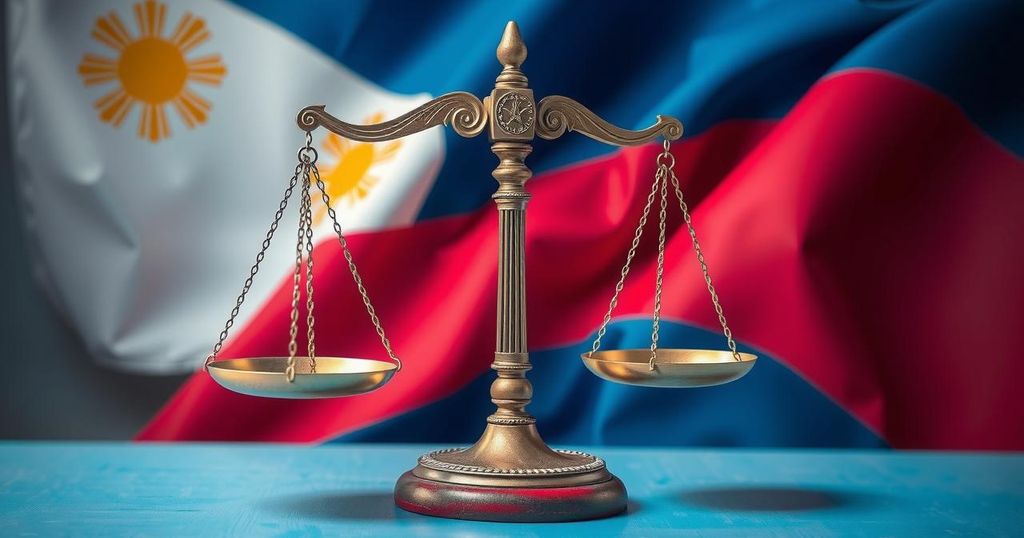Crime
ASIA, CRIME, DAVAO, DRUG TRAFFICKING, DU, DUBAI, DUTERTE, EMILY SORIANO, EUROPE, ICC, INTERNATIONAL CRIMINAL COURT, JANE LEE, JUSTICE, LEE, MICHAEL, MURDER, NETHERLANDS, PHILIPPINES, QUEZON CITY, RODRIGO DUTERTE, ROTTERDAM, UNITED ARAB EMIRATES, VIOLENCE, WORLD COURT
Sofia Rodriguez
0 Comments
Duterte’s ICC Arrest: A Step Toward Justice for Drug-War Survivors
The arrest of former Philippine President Rodrigo Duterte and his transfer to the ICC signifies a meaningful step toward justice for families affected by extrajudicial killings during his drug war. Survivors express mixed emotions of hope and continued fear as they await further legal developments and accountability. The political ramifications of this arrest could reshape the landscape in the Philippines, reflecting deeper issues of governance and human rights.
The arrest of former Philippine President Rodrigo Duterte and his subsequent transfer to the International Criminal Court (ICC) has been received as a significant moment for justice by families of victims of extrajudicial killings during his administration’s drug war. His flight to the Netherlands followed an arrest warrant issued by the ICC, marking a day of celebration for some families affected by police violence. Jane Lee, whose husband was killed, expressed her happiness and relief, stating, “I jumped for joy” at the news of Duterte’s arrest.
Survivors and victims’ families have long lived in fear of corrupt police actions following Duterte’s aggressive anti-drug campaign. Human rights organizations estimate that over 20,000 individuals, often labeled as drug offenders, have perished under this initiative, while official reports claim more than 6,000 deaths. The families of victims, including Emily Soriano, who lost her 16-year-old son during a police encounter, urge public solidarity in their quest for justice.
During a press conference, Jane Lee recounted the circumstances surrounding her husband’s death and expressed her outrage over the continued support for Duterte from some citizens. She stated, “What we went through was really hard,” highlighting the personal impact of the violence. Llore Pasco similarly shared her sons’ tragic fate and emphasized that while Duterte’s arrest is a promising start, it represents only the beginning of a longer judicial pursuit.
The Philippine Supreme Court has recently dismissed the attempt by Duterte’s legal team to block the ICC warrant, stating they did not demonstrate sufficient grounds for the issuance of a restraining order. Meanwhile, Duterte faces allegations of crimes against humanity connected to his drug policies, which extend back to his role as mayor of Davao City in 2011. Duterte’s legal representatives claim that his arrest is unlawful since he withdrew the Philippines from ICC jurisdiction during his presidency.
President Ferdinand Marcos Jr. affirmed the legal obligations of the Philippines to cooperate with international law enforcement, insisting the country is expected to act as a responsible member of the international community. Meanwhile, the political landscape is complicated by ongoing tensions between the Marcoses and the Dutertes, and heightened security measures have been instituted as supporters rally for Duterte in his political stronghold of Davao.
The recent arrest of Rodrigo Duterte marks a pivotal moment for families of victims in the Philippine drug war, symbolizing a step towards justice after years of repression and violence. Despite the hopeful sentiment among families like Jane Lee and Emily Soriano, significant challenges remain, as they seek accountability through ongoing legal processes. The situation highlights the complexity of international law’s intersection with national governance amidst political turmoil in the Philippines.
Original Source: www.benarnews.org




Post Comment